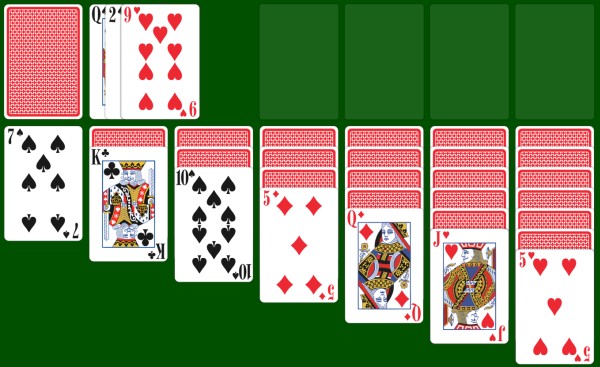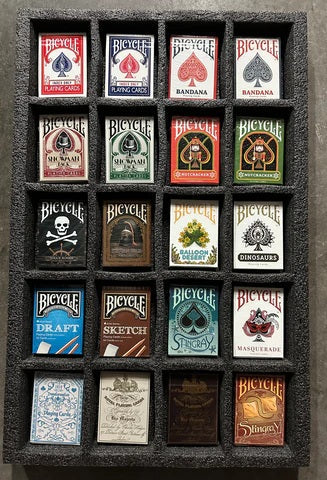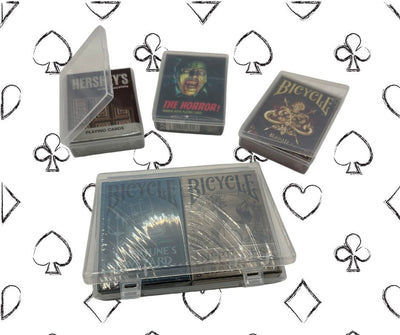I love games. And I love playing cards. So it won't come as a surprise that I also love playing traditional card games. These can be a great way to spend time with family and friends, in a relaxed and casual setting. Especially if you own a custom deck of playing cards, it be wonderful way to enjoy the artwork and graphic design of a lovely deck at the same time.
But what if nobody else is around, or when you're looking to kill some time when you're on your own? That's where solitaire card games come to the rescue. Especially in times of quarantine, solitaire card games are a great activity to enjoy, whether on the screen or with an actual deck. We all have moments where we're alone and need something to keep us amused, and solitaire card games can provide hours of enjoyment. And they'll provide something for all kinds of moments, with some coming down to pure luck, while many excellent ones require genuine skill, and can be a very rewarding challenge to play.
There are plenty of other reasons to enjoy solitaire games with a traditional deck of cards today, especially in view of the ease in which you can play them, such as a good online site where you can play them for free on your web browser. This makes them easier to learn and play than ever before. Especially given the incredible variety of solitaire card games in existence, it also allows you to explore a wide range of different games with leisure. Solitaire cards games are a great way to fill time, and you can play as long or short as you like. And they can be as relaxing as you like, or as challenging as you like. They're certainly incredibly satisfying, and even rather addictive. So let's learn a thing or two more about them, and whet your appetite to give them a go yourself!
When Did Solitaire Games Start?
As it turns out, playing solitaire games with a traditional deck of playing cards places us in a fine tradition with a long history - long before they ever came to your personal computer - because people have been enjoying them for over two hundred years already. Germany is a likely place of their origin, and there's a recorded mention of them already in the late 18th century. But their popularity especially bloomed in France in the early 19th century, and that's when some of the best solitaire games were devised. It is also in these French roots that the alternative name "patience" appears to originate, along with other common solitaire terms like "tableau". From France they eventually spread to English speaking countries, much like playing cards themselves did centuries before, and eventually solitaire card games became a popular international phenomenon enjoyed around the world. Even Napoleon is said to have whiled away many hours playing solitaire while in exile on St Helena. When you're playing a solitaire card game today, you're sharing in activity that has been enjoyed by many generations before you, and many of the great solitaire card games available are time tested and proven classics.But while solitaire card games have been around for a long time, the development of the personal computer was a real catalyst in popularizing them with modern audiences. Microsoft Windows has long had the practice of distributing a game of Solitaire with their operating systems, much to the relief of bored sales assistants and office workers around the globe. That single-handedly turned solitaire one of the world's most popular activities to do on a computer. Ever since the release of Windows 3.0 in 1990, Klondike Solitaire has been a staple on most personal computers, and it has now given hours of amusement to billions of people around the world for three decades. Countless people still turn to it for their quick five minute fix, which will of course be repeated many times over! Today Microsoft's solitaire package has grown to include Spider, FreeCell, Pyramid, and TriPeaks, making these the most familiar forms of the game for the average person.
Besides computer software, today there are also many websites where you can play a variety of different solitaire games online. Personally I've made good use of Solitaired.com, which offers more than 250 different solitaire games, and lets you play entirely for free, without ads, and without any need to register. Digital implementations like this allow us to play solitaire more quickly and easily, without all the hassles of set-up, shuffling, dealing, and moving columns of actual cards, making it even easier to fill a few spare moments. Besides simplifying the book-keeping elements of the game, they've also enabled versions of the game to be played that would be more difficult to do in person, like one suit Spider, where multiple sets of the same suit are used.
The result of the digital revolution means that solitaire card games are booming like never before, and even people who don't even own a physical deck of cards can spend countless hours enjoying different forms of these classic games. With a long history steeped in tradition, the computer age has injected solitaire card games with new energy and new possibilities, and there's never been a better time to explore what these games have to offer.
How do Solitaire Games Work?
There are an incredible amount of different solitaire games in existence, and they comprise an enormous family of games in their own right. But many of them do follow a somewhat similar pattern. This usually involves laying out cards on a tableau or layout, with the goal of moving them to foundations, where you build up each suit in sequence from Ace through King. This is accomplished with the help of turning up undealt cards from the stock, and by building and transferring columns of cards within the tableau that match in value, suit, or colour. That's a game of solitaire in a nutshell. But these games do have their own unique terminology, and this can best be understood by explaining how a typical game works, so let's dive into a little more detail.First you create an initial array of cards by dealing them in an initial tableau as prescribed by the rules of that particular game. In some games the cards dealt to the tableau are all face-up, creating an open game. In a closed game some cards are dealt face-down, so you have incomplete information at the start of the game. These cards only become revealed when cards blocking them have been moved, making them available to be turned face up or moved. Face-up cards in the tableau are usually placed in an overlapping configuration or cascade, so that you can see their indices, and so you can plan accordingly. Depending on the game, the arrangement can be in overlapping rows, or overlapping columns.
Your primary aim is to get cards onto the foundations, which in most solitaire games must begin with an Ace. Once you've placed an Ace, you can build up that foundation by placing further cards from that suit in sequential order. Your ultimate objective is to successfully build all the cards onto these foundations, in which case you have won the game. In solitaire card games, the standard sequence goes from Ace as the lowest ranked card to King as the highest ranked card. Usually you can only build from Ace through King, but some variations allow wrapping of a sequence so that an Ace can continue from a King, which is also called building around the corner.
To achieve the goal of playing all the cards to the foundations, you must manipulate the cards within the tableau, in order to get access to the cards you need, and to uncover face-down cards. This happens by transferring face-up cards, either individually or in columns, from different areas of the tableau, assuming these cards are free to be moved and are not blocked by others on top of them. Building cards in this way usually happens in ascending or descending order of rank, and is a key element of good game-play. Usually if the aim is to build up cards in ascending sequence to the foundations, then cards in the tableau may be built down in descending sequence, often in alternating colour. If you create a vacancy in the tableau by removing all the cards of a pile there, you can strategically use this space to manipulate the tableau to your advantage by starting a new column of cards there.
Often the entire deck isn't dealt out at the start of game, and the rest of the cards are considered the stock, which you bring into play by dealing them face-up into a separate pile called the waste (sometimes called talon, although confusingly in modern usage this term is often used instead to refer to the stock). These are often dealt one at a time, but in some games, like the extremely popular Klondike, there are variations where you deal them three at a time. In some variations you can only go through the stock once, while other solitaire games may allow a certain number of redeals, or even an unlimited number.
Not all games of solitaire can be successfully completed, but this is not necessarily the fault of the player. Sometimes a random deal will be theoretically unsolvable, and part of the challenge and fun of solitaire is to see whether or not you can achieve a win with a hand that you've been dealt. But you can't just blame the deal, because poor choices can lose a game in which you might have achieved a much better result with optimal play. You definitely learn to improve your play, and strategic choices will usually be rewarded!

Resources for Playing Solitaire
How to learnMost solitaire card games are easy to learn, and you'll find plenty of places online that provide lengthy lists of the different solitaire card games that exist, along with rules for each. As always, a good place to start your journey is Wikipedia, which has a page offering a list of common favourites. There are many websites set up by dedicated solitaire enthusiasts, some of whom have created software to help play the game on your mobile device or personal computer. These software programs typically go far beyond the two or three versions that Microsoft Windows has available, and offer you one hundred or more different ways to play. Many of these also serve as a resource, like BVS Solitaire Collection, and besides the software they have created for Windows, Mac, and iOS, they also host comprehensive rules. The Solitaire Game Rules page will help teach you Klondike, the most well known solitaire game, and introduce some variations.
In former times, the only way to learn how to play solitaire was by having the good fortune to be taught it in person by someone you know, or by wading your way through a pile of written words in a book. I remember trying that latter method as a teenager, and often giving up in frustration, as I tried to make sense of the words and turn them into an arrangement of cards on the table, as part of an unsuccessful attempt to figure out the rules. Nowadays it is so much easier to learn how to play solitaire, by simply playing it with a digital implementation that automatically enforces the rules and teaches you how to play. This makes it much more realistic to try new forms of solitaire, and I highly recommend this as the best way to learn, and to enjoy playing.
Where to play
There are several websites that offer solitaire card games, and enable you to play for free straight from your web browser. My personal site of choice recently has been Solitaired, which I can recommend. It has over 250 different solitaire variations, is ad-free, and I've found the gameplay smooth and straight-forward. Other sites to try include World Of Solitaire, Classic Solitaire, and Solitaire Network, which also offer an extensive number of different solitaire games, supply rules for each, and provide free online play.
If you're looking to explore the wonderful wide world of solitaire games beyond the limited menu provided by Microsoft, another alternative is to get some dedicated software for your personal computer or mobile device. Recommended commercial options for Windows include BVS Solitaire Collection, as well as SolSuite 2020 and Pretty Good Solitaire. The Python Solitaire Game Collection doesn't have as slick graphics, but it's completely free, has an extensive collection of games, and there is also a companion Android app that is also free.
There are many free apps available for iPad and iPhone, but these tend to be supported by ads, which can become a little annoying. Of the free apps available, I've had good success with Solebon Solitaire (Solebon), Solitaire City (Digital Smoke), Full Deck Solitaire (GRL Games), Solitaire Suite (Rikki Games), and 250+ Solitaires (Alxanosoft), all of which get you started with a very strong selection of the most popular solitaire games. The commercially produced apps tend to offer more games or polished features, and I suggest the following as the better ones: BVS Solitaire Collection (BVS Development), Solebon Pro (Solebon), Pretty Good Solitaire (Thomas Warfield), Solitaire Forever II (Solitaire Forever), and Hardwood Solitaire IV (Silver Creek Entertainment). If you're looking for a smaller collection of favourites to start with, try Solitaire Till Dawn (Semicolon) or Solitaire Deluxe 2 (Mobile Deluxe), both of which offer around one and a half dozen popular favourites for free.
Naturally once you're familiar with the rules of a particular solitaire game that you really enjoy, then you can grab your favourite custom deck of playing cards, and use that! There are miniature decks available for this purpose, but I think you'll get most satisfaction if you play with an attractive poker-sized deck. You will often need a decent amount of space to work with, and I highly recommend playing with a quality deck of playing cards to make your shuffling and dealing more pleasing on both a practical and an aesthetic level. If you need suggestions for a modern high quality deck, I suggest checking out the selection of Theory11 decks at PCD here.
What to play
It's important to realize that not all solitaire games are like the classics familiar from Microsoft Windows, such as Klondike and Spider. You should make an effort to explore the diverse range of solitaire games available, and even if you think you don't like Solitaire card games, it could just because you didn't like the one or two forms of the game you have tried until now. To get you started in your search, here's a list of some of the more popular solitaire games, arranged in different categories according to type:
● Adding & Pairing: Golf, Monte Carlo, Pyramid, TriPeaks
● Builders: Baker’s Dozen, Beleaguered Castle, Canfield, Forty Thieves, FreeCell, Klondike, La Belle Lucie (Lovely Lucy), Scorpion, Spider, Yukon
● Non-builders: Accordion, Aces Up, Calculation, Clock Patience, Cribbage Solitaire, Gaps (Montana), Grandfather's Clock
● Others: Miss Milligan, Osmosis, Sir Tommy, Sultan (Emperor), Windmill
I also highly recommend Bowling Solitaire by genius game designer Sid Sackson. It is entirely unlike all the other solitaire games mentioned, but is an incredibly thematic and clever game.

Recommendation
So what are you waiting for? There's never been a better time in history to explore the fun and variety of solitaire card games, especially with the help of a digital assistant who can help teach you some different games and manage the book-keeping and administration elements of the game for you. And especially if you're stuck at home as a result of quarantine or other restrictions, this might just be the thing you need to help keep you busy and amused.So fire up that solitaire software or website, or whip out a deck of cards, and fill a few minutes with a satisfying challenge!
Where to start: I suggest heading to Solitaired.com right now, for a quick and easy game of the world's most popular solitaire game, the classic Klondike.
Reference: For further reading about the history and nature of solitaire card games, see the article Patience: Playing-card solitaires by card game expert David Parlett.

Related Articles
Getting started with solitaire
- What You Should Know About Solitaire
- What's Good About Solitaire Card Games
- The Three Most Played Solitaire Games: Klondike, Spider, and FreeCell
- Two More Most Played Solitaire Games: Pyramid, and Golf
Builder solitaire games
- Popular Builder Solitaire Card Games
- More Popular Builder Solitaire Card Games
- 10 Builder Solitaire Card Games With Unusual Layouts
- 10 Less Common but Popular Two-Deck Solitaire Card Games
- Single-Deck Builder Solitaire Games That You Should Try
- Simple Builder Solitaire Card Games
Non-builder solitaire games
- Popular Adding and Pairing Solitaire Card Games
- Popular Non-Builder Solitaire Card Games
- Single-Deck Non-Builder Solitaire Games That You Should Try
- Simple Non-Builder Solitaire Card Games
Solitaire resources
- Advantages of Digital Solitaire
- Best iPad & iPhone Solitaire Apps
- Best Digital Resources For Playing Solitaire
- Special Features for Your Best Experience With Digital Solitaire
About the writer: EndersGame is a well-known and respected reviewer of board games and playing cards. He loves card games, card magic, cardistry, and card collecting, and has reviewed several hundred boardgames and hundreds of different decks of playing cards. You can see a complete list of his game reviews here, and his playing card reviews here. He is considered an authority on playing cards and has written extensively about their design, history, and function, and has many contacts within the playing card and board game industries. You can view his previous articles about playing cards here. In his spare time he also volunteers with local youth to teach them the art of cardistry and card magic.






4 comments
All I want to do is to PLAY
Very good
Is possible to play as Vegas stile? Why does not have a warning when there is no more options to continue the game?
I love playing cards and card games too! My sleight of hand and magic routines are…well, terrible. So finding games to play with all those decks is a really great way to get to enjoy all the designs and art. I also created my own game which incorporates a standard deck of cards, the fancier the better! My game is called BattleSauce and can also be played by a single player. I love to sort through my decks and create “special” features based on the design and art of each deck. Thank you for the great article and I’m looking forward to checking out that Bowling Solitaire game! Right now even!